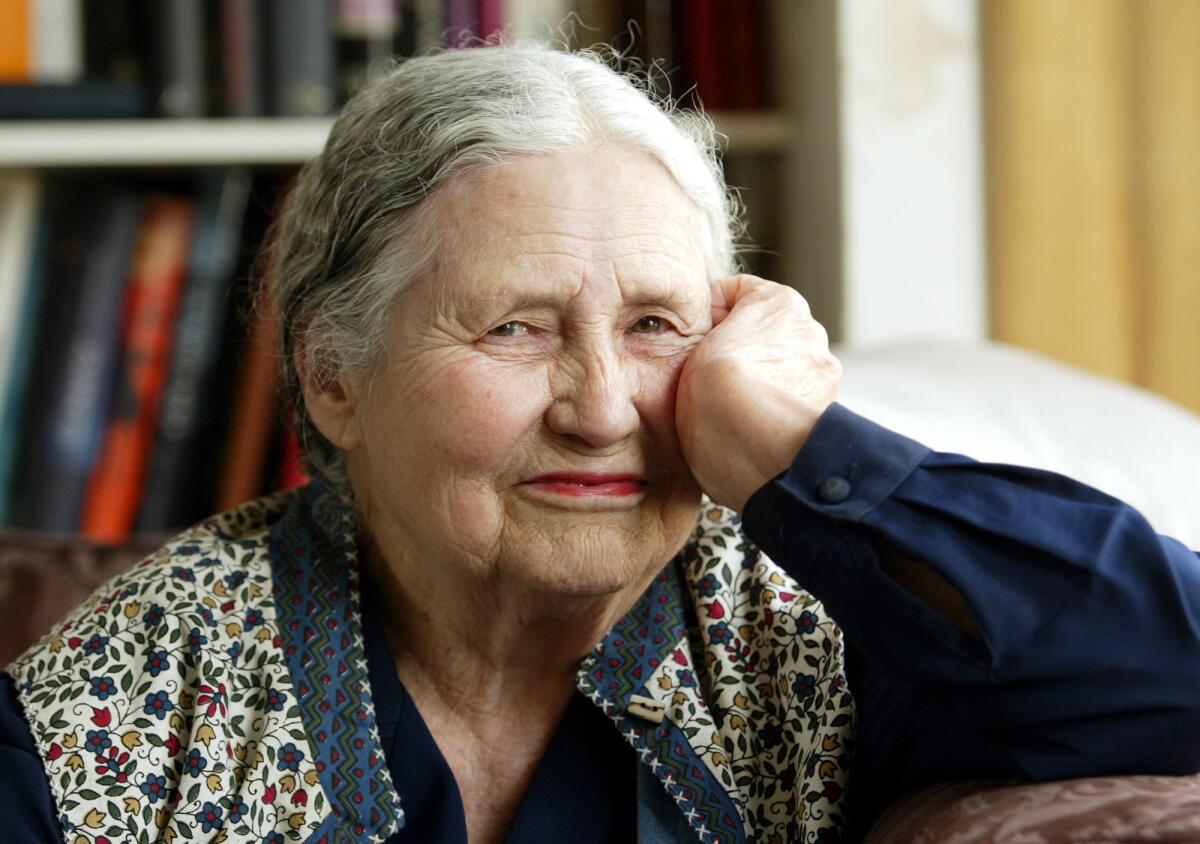Doris Lessing remembered: Provocative, blunt, unforgettable

- Share via
There’s a tidbit deep in the Times archive that reminds us of just what a brilliant artist and provocateur Doris Lessing could be.
Lessing died Sunday at the age of 94. Back in 1984, she was already one of England’s most celebrated novelists: She’d written two dozen books and was being mentioned in news reports as a potential recipient of the Nobel Prize for Literature, though she’d have to wait 23 years more to win it. She wanted to prove to her readers just how fleeting and fickle publishing fame could be. So she wrote two novels under a pseudonym and submitted them to publishers. Both were repeatedly rejected.
One of these stealth Lessing novels was “not commercially viable,” her own publisher, Jonathan Cape said. Another publisher called the book “too depressing” to be successful. She did manage to persuade a British house to publish the second book, but it sold a mere 1,500 copies in Britain. (Her classic “The Golden Notebook” had by then sold close to 1 million copies.) Finally Lessing told the world what she had done. The new, unheralded novel by “Jane Somers” was actually Lessing’s. She had performed this experiment, she told reporters, “to dramatize the plight of unknown writers.”
On Sunday, reminiscences and appreciations for this uniquely compassionate and insightful “quiet radical,” (as Agence France-Presse called her) came from writers and editors across a literary world that took pleasure in recalling their encounters with her.
One came from the New Yorker, which reposted an essay written in July by one of the publishing-house readers who’d rejected that “Jane Somers” manuscript. That reader, the now-published novelist James Lasdun, wrote: “It has taken me 30 years to recognize the magnitude of my loss.” Only recently, Lasdun wrote, did he get around to reading Lessing’s classic “The Golden Notebook.”
“I won’t try to describe the experience of reading it except to say that it is unlike any other book I’ve ever read,” Lasdun wrote. “And that it contrives to make the most ordinary situations — a couple arguing, a woman cooking a meal — into epicenters of weather systems stretching from McCarthyite America to apartheid South Africa to Stalinist Russia.”
The Daily Telegraph republished its last interview with Lessing, which included her musings on the factors that led a World War I private named Adolf Hitler to become so angry, and her thoughts about winning the Nobel Prize: “Who are these people? They’re a bunch of bloody Swedes.”
“She doesn’t care what people might think,” Nigel Farndale wrote. “She is past caring. And there is a greatness to this lack of care. How many 88-year-olds do you know who have become a worldwide phenomenon on YouTube, for example?”
In said YouTube video, Lessing climbs out of a taxi with her son and a bag of groceries and says, “Oh, Christ,” when told she’s won the Nobel Prize. “I’m sure you’d like some uplifting remarks of some kind.”
Lessing’s work was often celebrated by reviewers in The Times.
“Doris Lessing has a powerful voice and a particular one,” Richard Eder wrote in a 1992 review of “The Real Thing” for The Times. “It speaks in anger at the distortion of personal relations in an unsound society, but speaks it with a wit that manages to be both pitiless and compassionate.”
In 1984, at about the same time her pseudonymous novels were being rejected and ignored, Doris Lessing did something else unexpected. In a talk at UCLA, the same writer who’d taught her readers a lesson about how fickle publishing was proclaimed, “We are living, without knowing it, in the Golden Age of the novel.” She celebrated the growing number of women writers, and writers from Africa.
About the writing of her own novels, Lessing told her Los Angeles audience: “I think most of this is very hard work, you know. I’ve always disliked words like inspiration. Writing is probably like a scientist thinking about some scientific problem, or an engineer thinking about some scientific problem.”
Lessing would go on to write more than 60 books, including works of science fiction, non-fiction, poetry and memoir.
ALSO:Doris Lessing has died at 94
Flannery O’Connor and the art of prayer
Official wants to de-fund library, users should ‘go back to Mexico’
More to Read
Sign up for our Book Club newsletter
Get the latest news, events and more from the Los Angeles Times Book Club, and help us get L.A. reading and talking.
You may occasionally receive promotional content from the Los Angeles Times.











